
General Dental Care
Our dental team will help you keep your teeth healthy by providing, Restorative, Orthodontic and cosmetic services, which can be discussed at your regular dental check-ups.
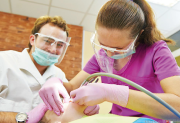
Independent Care
We offer Independent dental services, that are not offered under NHS such as cosmetc crowns, bridges, veneers, teeth whitening and dental implants for patients over the age of 18.

Family Dental Care
We are your local family friendly dental clinic, located at the heart of Inverness, on the banks of river Ness, managing your children’s checkups to dentures, facial aesthetics and implants.
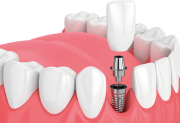
Dental Implant Care
Dental implants are a very effective way of replacing missing teeth. Custom made, for each of our patients it is possible to match perfectly with your natural teeth.
Restorative Dental
Improve your appearance with EVOLUTION DENTAL advanced Restorative Dental Service. Returning your teeth to good health and an aesthetically pleasing appearance are goals that need not be exclusive to one another.
Fillings
There are many types of fillings available. Amalgam Fillings are silver, metal fillings. Amalgam has the benefit of being strong and long-lasting and the dentist can complete the work in one appointment. They are the least expensive option.
Composite Resin Fillings, known as white fillings, made from plastic and glass particles. These take longer to complete as they have to be applied in layers which must be cured using a visible blue light.
Glass Ionomer Fillings are made from acrylic and fluoroaluminosilicate. They are also tooth coloured and are semi permanent fillings used for fillings in young children, fillings at the gum margin in adults and for teeth with poor prognosis
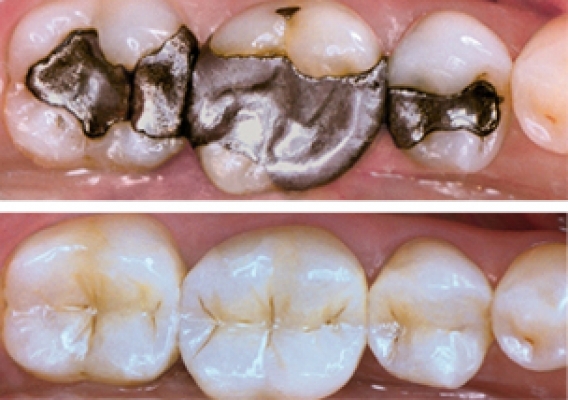
Crown and Bridges
Crowns and bridges are porcelain or metal teeth that cover existing teeth. They are fixed to your teeth and can only be removed by your dentist unlike dentures which can be easily removed from the mouth.
Crowns recreate the shape of a broken down tooth allowing it to be useful in chewing as well as improving the appearance. Crowns are made from various materials with gold and metal alloys offering the most strength. Porcelain or ceramic crowns are also as strong and can be colour matched to the surrounding teeth.
Bridges may be recommended if you have a tooth or teeth missing. They are made from various materials which vary in both appearance and cost. Ceramic and porcelain bridges can also be colour matched to the surrounding teeth. The creation and fitting process for a bridge is the same as for a crown but one or more teeth either side of the space will be prepared.
First the dentist will reduce the tooth and then create a mould by taking an impression of the teeth so they can create the crown using the requested material and shade if applicable.
You will always have a temporary crown/filling on the prepared tooth/teeth before you leave the surgery. At the next appointment your dentist will remove the temporary crown and fit the permanent one
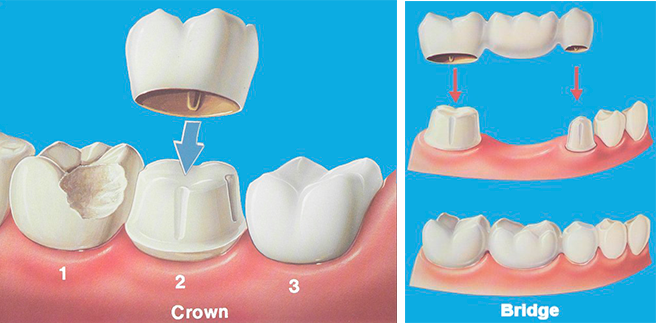
Dentures
Dentures are made with a base that matches the colour of the gums and teeth with a shape and colour tailored to suit you. They are made completely from acrylic or from metal and acrylic.
The stages of making dentures include taking moulds of the teeth and gums, noting how your jaws meet together and trial dentures. New dentures will feel very different to having your natural teeth. Initially there can be some discomfort while your mouth adjusts to the shape of the new dentures and this can be solved easily by returning to your dentist to have them adjusted.
If you are missing many teeth, you may find chewing more difficult or you may not have a complete smile and the muscles of your face may collapse. We can offer partial dentures which will replace a few teeth, or full dentures which replace all of the teeth in the mouth
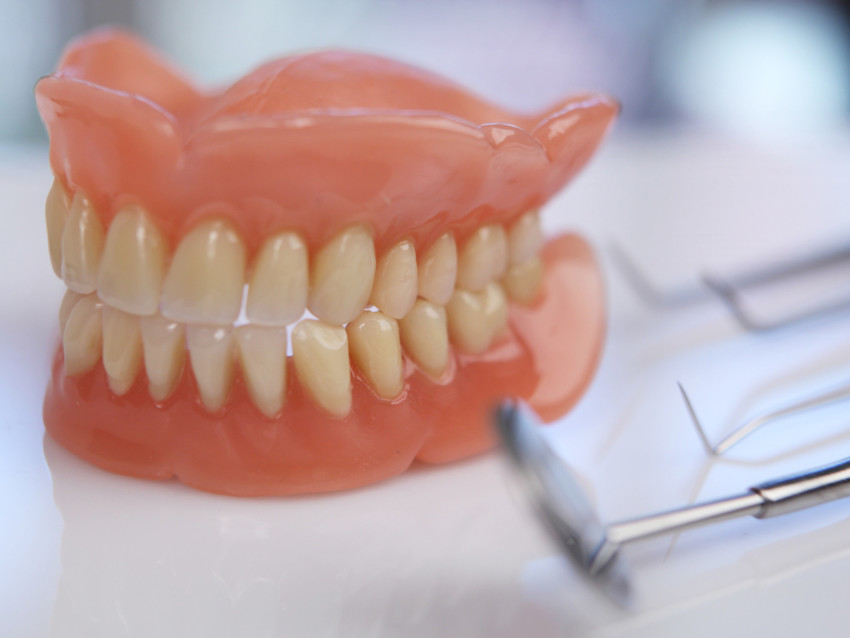
Root Canal Treatments
Root canal treatment is used when the nerve of a tooth has died or has become damaged and the channels in the roots have become infected. Bacteria then spreads along the root channels causing inflammation, leading to pain and facial swelling. To treat the infected tooth it may be necessary to perform a dental extraction but it is preferable to save the tooth by cleaning out the root channels and taking away the dead, infected pulp. Once cleaned the root channels are sealed and restored using a filling or a crown.
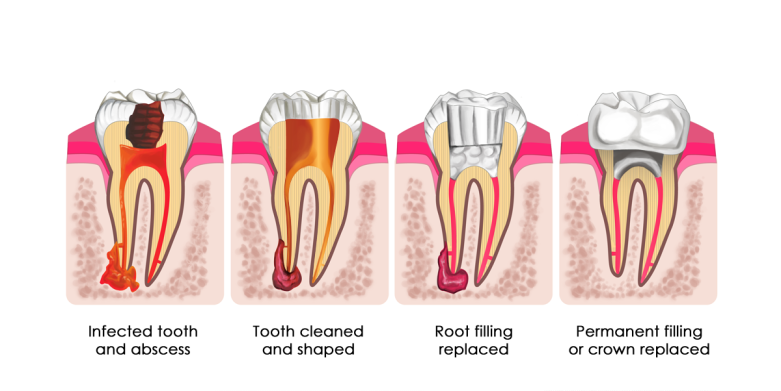
FAQ
Please find some of the most commonly asked questions & answers about the restorative dental at Evolution Dental.
Mr. Fary Johnson Vithayathil BDS MSc Pg Diploma Clinical Implantology (University of Newcastle).
A dental implant is an artificial root which is placed into the jawbone. This is then used to support an artificial tooth known as a dental crown. A number of implants can be used to replace multiple missing teeth.
Implants are made of pure titanium, or a combination of titanium and zirconium. These materials are very well accepted by the body, so an implant can unite with the tissues around it. Once this has happened, usually after around twelve weeks after the procedure, a restoration such as a crown can be attached to the implant to create the new tooth.
At Evolution Dental Practice we use Biohorizon implant systems which are from global leaders in Implantology. Extensive international research has shown that there is over a 90% chance that a quality implant restoration will remain in successful use 10 years after being placed.
Placing a dental implant is often easier than taking a tooth out and is usually done under a simple local anaesthetic, similar to when having a filling done. The procedure itself is comfortable, but just like after an extraction, you may feel some discomfort for a few days after the dental implant is placed.
Your dentist will be able to give you an idea of the treatment time during your consultation. Usually the final teeth are fitted onto the dental implants 3-4 months after the dental implants are placed.
You will be given advice on how to look after your dental implants, both immediately after dental implant placement and for long term care. Cleaning dental implants is no more difficult than looking after natural teeth.
Most teeth are permanently fixed to dental implants and will look and feel like natural teeth. If you have removable dentures secured by dental implants, these can usually be removed for cleaning.
Although dental implants are made of titanium, this is hidden under the gum, and the dental implant will look just like a natural tooth. The new teeth can be designed to match exactly with your own teeth.
A single missing tooth will need one dental implant. If you have two or more missing teeth next to each other these can often be replaced with just two implants Your dentist will advise you as to where implants will be needed depending upon the teeth which need replacing.
Dental implants can generally be placed in most patients. Some factors that can affect suitability for dental implants include a small number of medical problems and certain medications. Sometimes there may not be enough jawbone but an additional procedure can be carried out to bulk up the bone prior to placing dental implants. Our implant dentist will assess you and provide a bespoke treatment plan and discuss the cost of treatment at your first consultation.
Do nothing, i.e. accept the gap. Although seemingly the simplest option, teeth around a gap will usually move into the gap to some extent. Whilst this doesn’t always happen, it usually does and may lead to food trapping and problems with the bite.
Bridges:- A bridge is attached to one or both teeth at the sides of the gap, and replaces the missing tooth. Bridges can be very successful, but have the drawbacks of committing one or more teeth to holding the bridge, which may lead to problems with these teeth in the future
Partial denture (plate):- This is a simple type of restoration, but is removable i.e. not fixed to the teeth. In some situations, it can be a good option, e.g. if many teeth are missing, but if one or two only are missing it is generally quite a poor option, as they are quite bulky.
Initial assessment visually and with an ‘x-ray.
A small CT scan is taken to accurately assess the area of the gap in 3-D, and allow detailed treatment planning of the implant stages
Review and discussion to explain the treatment procedures
Implant placement, and possibly placement of a temporary tooth/teeth
Review of the implant, impressions and placement of the permanent restoration
(e.g. a crown) Reviews to assess ongoing implant health.
Need to know more..? Call Us Today To discuss how Evolution Dental can help you with the Restorative Dental Treatments, Please contact us on 01463 233421